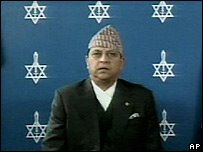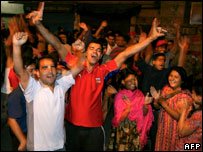In a Retreat, Nepal's King Says He Will Reinstate Parliament
KATMANDU
Binod Joshi/Associated Press
There were street celebrations in Katmandu, Nepal, after King Gyanendra went on television late this evening to concede to the demands of the angry pro-democracy demonstrations.
A four-hour television series and interactive web site by The Times, The Canadian Broadcasting Corporation and the ZDF network of Germany.
His offer came on the eve of what were billed as the largest demonstrations to date. The political parties that began the protests 19 days ago had been preparing to encircle the city center on Tuesday. Instead, celebrations broke out late Monday night on the streets of the capital, Katmandu.
"We are confident this house will contribute to the overall welfare of Nepal and the Nepali people," the king, looking ashen, told the nation in an address broadcast on state-owned television. "We are confident that the nation will forge ahead toward sustainable peace, progress, full-fledged democracy and national unity."
For the first time, the king acknowledged the protests that have prompted hordes of Nepalese to defy shoot-on-sight curfew orders and have brought the capital to a virtual standstill. At least 13 people have been killed by police officers and soldiers since the demonstrations began. "We extend our heartfelt condolences to all those who have lost their lives to the people's movement," the king said.
He did not, however, explicitly address the demands for a referendum to redraw the nation's Constitution and let the Nepalese people decide on the future of the monarchy. The vote on the Constitution is a principal demand of the Maoist rebels, who have fought a bruising 10-year insurgency to defeat the monarchy.
They have lately linked arms with Nepal's political leaders and offered their blessings to the protests. Their influence has also been felt on the streets, with demonstrators ever more loudly calling for the end of the monarchy.
Whether the Maoists, Nepal's political leaders and the people in the streets would allow King Gyanendra to hold onto the monarchy remained an open question. It also remained to be seen whether the king's latest concession would be resisted by the more radical members of the opposition.
"This is the victory of the people on the street," Ram Chandra Poudel, a central committee member of the Nepali Congress Party, said minutes after the king's address.
The Maoists issued no comment on the king's speech on Monday night. But the previous night, the army said, they attacked government buildings in a small town barely five hours by road from the capital, luring the Royal Nepalese Army into a gunfight that killed six people, including one soldier.
Initially at least, protesters and political leaders greeted the address with glee, though the king stopped short of fulfilling what for him is certainly their most unpalatable demand: his abdication. The king did not renounce the throne, only the power he seized 14 months ago and retained with the help of the security forces under his command.
Certainly, he also gave up more than he had intended. Only three days ago, the king offered to allow the political parties to appoint a prime minister of their choosing. The parties turned down that offer, pinched as they were between pressure from the Maoists, their angry foot soldiers on the street, and their own distrust of the king.
Flouting pressure from abroad, party leaders insisted at the time that they would not stop agitating until the king agreed to reinstate Parliament and permit a referendum on the Constitution, which enshrines the monarchy and gives it control of the military.
Still, the king's offer on Monday to restore Parliament, effective Friday, was a significant retreat.
Within minutes of his appearance, the streets of Katmandu exploded in jubilation.
In the Tinkune section of the capital, a man with bandages around his head jumped and shouted. "I wouldn't mind losing my life for democracy," said Bhagawan Bhandari, 44. He had been injured by King Gyanendra's baton-wielding police force at a protest on Friday.
The State Department issued a statement saying that the king "should now hand power over to the parties and assume a ceremonial role in his country's governance," Reuters reported. The king's announcement came hours after the State Department had ordered all nonessential embassy staff and family members to leave the country.
Tilak P. Pokharel contributed reporting for this article.
Monday, April 24, 2006
April 24
.Full text of the royal proclamation
House of Representatives reinstated
KATHMANDU, April 24 - Beloved Countrymen,
Convinced that the source of State Authority and Sovereignty of the Kingdom of Nepal is inherent in the people of Nepal and cognizant of the spirit of the ongoing people's movement as well as to resolve the on-going violent conflict and other problems facing the country according to the road map of the agitating Seven Party Alliance, we, through this Proclamation, reinstate the House of Representatives which was dissolved on 22 May 2002 on the advice of the then Prime Minister in accordance with the Constitution of the Kingdom of Nepal-1990. We call upon the Seven Party Alliance to bear the responsibility of taking the nation on the path to national unity and prosperity, while ensuring permanent peace and safeguarding multiparty democracy. We also summon the session of the reinstated House of Representatives at the Sansad Bhawan, Singha Durbar at 1 P.M. on Friday, 28 April 2006.
We are confident that this House will contribute to the overall welfare of Nepal and the Nepalese people.
We extend our heartfelt condolences to all those who have lost their lives in the people's movement and wish the injured speedy recovery. We are confident that the nation will forge ahead towards sustainable peace, progress, full-fledged democracy and national unity.
May Lord Pashupatinath bless us all! Jaya Nepal!
House of Representatives reinstated
KATHMANDU, April 24 - Beloved Countrymen,
Convinced that the source of State Authority and Sovereignty of the Kingdom of Nepal is inherent in the people of Nepal and cognizant of the spirit of the ongoing people's movement as well as to resolve the on-going violent conflict and other problems facing the country according to the road map of the agitating Seven Party Alliance, we, through this Proclamation, reinstate the House of Representatives which was dissolved on 22 May 2002 on the advice of the then Prime Minister in accordance with the Constitution of the Kingdom of Nepal-1990. We call upon the Seven Party Alliance to bear the responsibility of taking the nation on the path to national unity and prosperity, while ensuring permanent peace and safeguarding multiparty democracy. We also summon the session of the reinstated House of Representatives at the Sansad Bhawan, Singha Durbar at 1 P.M. on Friday, 28 April 2006.
We are confident that this House will contribute to the overall welfare of Nepal and the Nepalese people.
We extend our heartfelt condolences to all those who have lost their lives in the people's movement and wish the injured speedy recovery. We are confident that the nation will forge ahead towards sustainable peace, progress, full-fledged democracy and national unity.
May Lord Pashupatinath bless us all! Jaya Nepal!
People wins

Nepalis cheer climbdown by king
Nished Gautam
Jubilant Nepalis have taken to the streets in celebration after embattled King Gyanendra agreed to their demands to reinstate parliament.
"This is the people's victory! Long live democracy!" hundreds chanted in parts of the capital Kathmandu.
Opposition leaders say a huge anti-monarchy protest planned for Tuesday will now be a victory rally.
The king's announcement follows weeks of unrest by opponents to his absolute rule. At least 14 people have died.
A tired and tense-looking King Gyanendra announced the move in a late-night televised address, saying it was aimed at "protecting multi-party democracy and restoring peace".
He said the lower house of parliament would reconvene on Friday.
The US welcomed his announcement and said he should now consider assuming a "ceremonial role" in the country's governance.
On Monday, thousands of demonstrators defied a shoot-on-sight curfew in Kathmandu.
But the mood turned to one of celebration after the king's address at 2330 local time (around 1800GMT).
Hundreds streamed into the streets of Kathmandu and other towns, chanting, clapping and singing.
"The people from every corner are pleased to come and celebrate," bank employee Prakash Nepal, 40, told the Associated Press.
Condolences
The opposition alliance is due to meet to discuss the next step in resolving the country's crisis, opposition leader Shobhakar Parajuli told the BBC.
He said the mass rallies planned for Tuesday would go ahead, but would be a victory celebration and no longer a protest rally.
In his address, the king expressed his "heartfelt condolences to all those who have lost their lives in the people's movement and wish the injured speedy recovery".
He added: "We are confident that the nation will forge ahead towards sustainable peace, progress, full-fledged democracy and national unity."
The protests and a crippling strike led the United States to order all its non-essential diplomatic staff and their families to leave Nepal.
More than 13,000 people have died in the 10-year Maoist insurgency aimed at replacing the monarchy with a communist republic.
The king assumed direct powers in February 2005 saying parties were unable to deal with Maoist rebels.
Violence has escalated since the rebels ended a truce in January - although they declared a ceasefire in Kathmandu this month as street protests began against King Gyanendra.
A series of curfews have been in force in the city in recent days, but ignored by demonstrators.
bbcnews.com
Subscribe to:
Comments (Atom)

